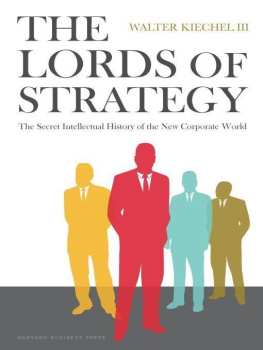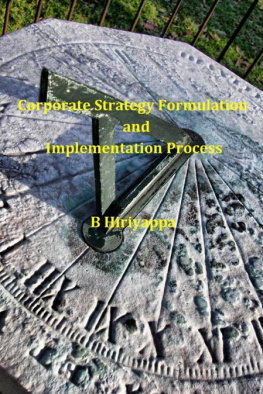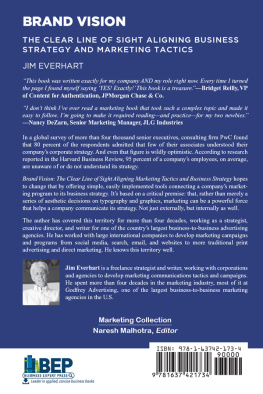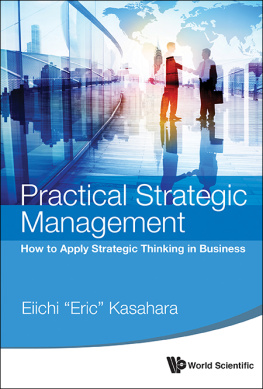Table of Contents
Copyright 2010 Walter Kiechel III
All rights reserved
Printed in the United States of America
14 13 12 11 10 5 4 3 2 1
No part of this publication may be reproduced, stored in or introduced into a retrieval system, or transmitted, in any form, or by any means (electronic, mechanical, photocopying, recording, or otherwise), without the prior permission of the publisher. Requests for permission should be directed to permissions@hbsp.harvard.edu, or mailed to Permissions, Harvard Business School Publishing, 60 Harvard Way, Boston, Massachusetts 02163.
Library of Congress Cataloging-in-Publication Data
Kiechel, Walter.
The lords of strategy : the secret intellectual history of the new corporate world / Walter Kiechel III. p. cm.
ISBN 978-1-59139-782-3 (hardcover : alk. paper) 1. Business planning. I. Title.
HD30.28.K496 2009
658.4012dc22
2008050381
The paper used in this publication meets the requirements of the American National Standard for Permanence of Paper for Publications and Documents in Libraries and Archives Z39.48-1992.
for Genie Dunstan
and we rose up like wheat, acre after acre of gold
Anne Sexton
Preface
Three Common Beliefs to Be Discarded
Bruce Doolin Henderson achieved executive position at an early agehe was the second youngest vice president in Westinghouses historybut he was fired from that job and every job thereafter, something he bragged about. Then, in 1963, he founded the Boston Consulting Group, which changed the world. The Financial Times would say of him, on his death in 1992, few people have had as much impact on international business in the second half of the twentieth century. Have you ever heard of Bruce Henderson?
What he and his consulting firm did was to launch the corporate-strategy revolution. Revolutions seem to occur every day in the world of business, or so you would believe if you listen to journalists acclaiming the latest technological wonder or to the authors of most new books on management. But the rise of strategy qualifies as the genuine, consciousness-transforming article. Strategys coming to dominance as the framework by which companies understand what theyre doing and want to do, the construct through which and around which the rest of their efforts are organized, eclipses any other change worked in the intellectual landscape of business over the past fifty years.
Understanding the strategy revolution requires getting beyond three common beliefs. The first is that at bottom, ideas dont really matter that much in business. To be sure, skeptics admit, an idea for a great new product can make a huge difference, for a mass-produced automobile, say, or a personal computer. But ideas for how to think about a business, or analyze its dynamics?
Those of little faith in this regard dont usually state their views flat out. What they say instead is, Business is mostly a matter of common sense. (How eager we are to believe in the democracy of commerce.) Or, You can have the best idea in the world, but if you cant execute... (Action trumps cerebration every time, supposedly.)
This lack of enthusiasm for the power of ideas extends more widely than one might suspect. Most people familiar with the field would probably agree that the leading journal of management ideas aimed at practitioners is Harvard Business Review . But fewer than 4 percent of the sixty-five thousand living alumni of the Harvard Business School subscribe to that venerable publication. On its op-ed pages, the Wall Street Journal routinely mounted closely argued exegeses of economic, political, and policy concepts. Comb through the newspapers archives for the past four decades, though, and try to find comparably detailed coverage of the experience curve, say, or the value chain, or time-based competition. If you want to make a management consultant squirmingly uncomfortable, even one who churns out articles and books, just ask whether he or she thinks of himself or herself as an intellectual.
Bruce Henderson would probably have pleaded guilty, but not because he was besotted with ideas for their own sake. He was, instead, obsessed with figuring out how the world works. For him, this meant identifying both the principles that explain how companies compete and the means of microeconomic analysis with which to arrive at those principles. More particularly, he sought to understand how one company achieves an advantage over others. Henderson represents the first of the breed that will drive this history, the intellectual as corporate warrior, firebrand, entrepreneur, maverick, and impresario.
He wanted to use the concepts he dug from the messy back-and-forth of competition to change the world of business, beginning with his clients behavior and performance. In this, his aspirations were utterly representative of the strategy revolution as a whole. Its course features a rowdy parade of ideas and analytical techniques jostling each other down the historical road, the ones further back often sneering at those in the van, but all clamoring for the attention and money of corporations.
In other wordsand maybe this helps ward off the dread specter of intellectualismthese were almost always ideas sharp with a purpose, namely, to solve a problem bedeviling a company. The secret intellectual history of the new corporate world is as much about the challenges companies faced, from competing with the Japanese in the 1970s to surviving a crisis in the global financial system in the twenty-first century, as it is about the conceptual solutions devised in response. Our story is, in that sense, an account of how the economy and the world we live in today have become what they are. Stock markets rise, fall, rise again, then come crashing down, as they have done recently. Nations wax and wane in their prosperity. Wars break out on distant frontiers. Through it all, strategy has enjoyed a remarkable constancy, the preferred if ever-evolving framework by which companies understand what is happening to them and how they should react.
To say that fifty years ago, before Henderson, there was no such thing as corporate strategy is to invite incredulity. What do you mean, goes up the cry, havent well-run companies and their leaders always had strategies? What about Rockefeller with Standard Oil, Ford with his motor company, the Watsons and IBM? Which is as much to say, how could strategy possibly have an intellectual history? Another common belief to be overcome.
To be sure, smart enterprises throughout history have had a sense of how they wanted to make money. They typically knew a lot about the products or services they sold, a middling amount about their customersoften considerably less than they do nowand as little or as much about competitors as their closeness to a monopoly position necessitated. (Think of the American auto companies obliviousness to the growing threat posed by the Japanese through the 1980s. From his elevated perch as CEO, Henry Ford II dismissed the Toyotas and Datsuns arriving in his market as those little shitboxes.) Year to year, companies made plans, mostly simple extrapolations of what they had been doing. Plans, not strategythe latter word making only scattered appearances in the corporate vocabulary before 1960.
What companies didnt have before the strategy revolution was a way of systematically putting together all the elements that determined their corporate fate, in particular, the three Cs central to any good strategy: the companys costs, especially costs relative to other companies; the definition of the markets the company servedits customers, in other wordsand its position vis vis competitors. If an enterprise had different lines of business, it might view these in historical termsFirst we got into radio, which led us into televisionor as a capital allocation puzzle. But it wouldnt think of the array as a portfolio of businesses, each of which might be grown or harvested, bought or sold, in service to a larger corporate purpose. Most dangerous of all, the prestrategy worldview lacked a rigorous sense of the dynamics of competitionIf we do this, the other guy is likely to do that. It was like trying to do large-scale engineering without knowing the laws of physics. As a set of ideas, strategy sought to remedy all these deficiencies.











